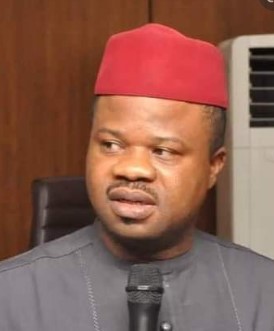Journalists who went to cover the resumed trial of Nnamdi Kanu, leader of the separatist group, Indigenous People of Biafra (IPOB), were on April 8, 2022, barred from entering the premises of the Federal High Courtin Abuja on the orders of the Chief Judge of the court, Justice John Tsoho.
Operatives of the Department of State Services (DSS) barricaded all roads leading to the Court and so effectively prevented people, including journalists from entering to cover or witnessing the trial.
The Chief Information Officer of the Federal High Court, Catherine Christopher, had on April 7, 2022 announced that a new ‘Practice Direction’ issued by the Judge bars journalists and members of the public, except the legal counsels to the parties, from attending proceedings in terrorism-related cases.
The statement said Justice John Tsoho, issued the directive in the exercise of his constitutional powers as enshrined in Section 254 of the Nigerian Constitution.
The new directive, which takes immediate effect means that trial of terrorism-related offences will henceforth be conducted in camera.
“Proceedings of offences of terrorism, subject to the provisions of section 232 of the Administration of Criminal Justice Act, 2015 and section 34 of the Terrorism (Prevention) Act, 2011 (as amended), shall be held in camera or as may be ordered by the Court,” the document says.
The rules also make provision for the exclusion of “any person other than the parties and their legal representatives” from terrorism proceedings.
The new rule prohibits media coverage except where the trial judge grants permission as it says: “The coverage of proceedings under these Practice Directions is strictly prohibited, save as may be directed by the Court.”
The rule also empowers the trial court to “make an order as to any electronic devices that would be allowed during the proceeding.”
The document also provides that anyone who violates the practice directions is deemed to have committed an offence under the terrorism law.
“A person who contravenes an order or direction made under these Practice Directions shall be deemed to have committed an offence contrary to section 34(5) of the Terrorism (Prevention) Act, 2011 (as amended).
“These Practice Directions shall be cited as the Federal High Court Practice Directions (On Trial of Terrorism Cases) 2022,” it says.







